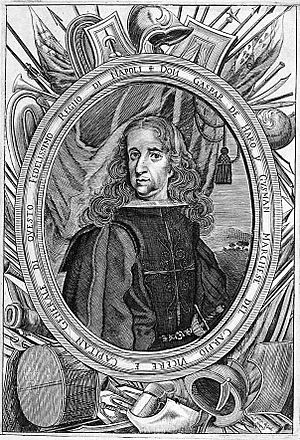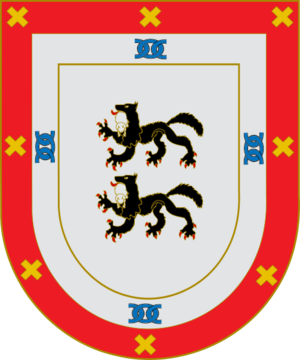Gaspar Méndez de Haro, 7th Marquess of Carpio facts for kids
Gaspar Méndez de Haro (born June 1, 1629 – died November 16, 1687) was an important Spanish politician and a big art collector. He held many high titles, including the 7th Marquess of Carpio and 2nd Duke of Montoro. He was also a Grandee of Spain three times, which was a very high honor given by the king.
Gaspar de Haro served as the Governor of Flanders and was an Ambassador in Rome from 1677 to 1682. Later, he became the Viceroy of Naples in 1683, a role he held until his death in 1687.
Contents
Who was Gaspar de Haro's family?
Gaspar de Haro came from a very powerful family in Spain. His father was Luis de Haro, the 6th Marquess of Carpio and the 1st Duke of Montoro. Luis de Haro was a very important advisor to the King of Spain, known as a valido.
Gaspar's mother was Catalina Fernández de Córdoba y Aragón. Her family also held many important titles, like the Duke of Segorbe and Duke of Cardona. The title of Marquess of Carpio was first given by King Philip II of Spain in 1559 to one of Gaspar's ancestors.
The family's coat of arms shows two wolves eating lambs. This symbol comes from old Basque and Navarre stories. The golden St. Andrew's crosses on the shield show their connection to families who helped conquer cities like Úbeda and Baeza in the 1200s.
Gaspar de Haro's political life
Gaspar de Haro's father, Luis de Haro, took over from his uncle, Gaspar de Guzmán y Pimentel, Count-Duke of Olivares, as the King's main advisor. Gaspar de Haro wanted to follow in his father's footsteps and become a powerful politician.
However, his plans didn't always work out. At one point, he was suspected of being involved in a plot. Because of this, he was sent to Portugal to fight in a war. He was captured after a battle called Montes Claros.
Later, in 1677, he was given a new chance. He was sent to Rome to be the Spanish ambassador, representing Spain in Italy. He stayed there until 1682. After that, he became the Viceroy of Naples, which was a Spanish territory at the time. He served as Viceroy until he died in 1687.
Gaspar de Haro as an art collector
Gaspar Méndez de Haro was famous for his amazing art collection. While he was in Rome, he had an agent named Antonio Saurer who helped him buy important artworks from places like Venice.
When Gaspar de Haro died in 1687, he owned an estimated 3,000 paintings! About 1,200 of these were in Spain, and the rest were in Naples.
His collection included some very famous paintings, such as:
- the Rokeby Venus by Diego Velázquez
- the Magdalene by Titian
- several paintings by Tintoretto
- Christ Crowned with Thorns by Antonello da Messina (which is now in the Metropolitan Museum of Art)
He even asked the famous sculptor Bernini to make a copy of his well-known fountain from the Piazza Navona in Rome. Gaspar wanted this copy for Naples.
Some paintings from his collection
-
Ecce Homo
by Antonello da Messina (1475)
Who inherited Gaspar de Haro's titles?
Gaspar de Haro was married twice. His first wife was Antonia de la Cerda Enríquez de Ribera y Portocarrero, who passed away in 1670. After her death, he married Teresa Enriquez de Cabrera in 1671.
Gaspar and Teresa had one daughter named Catalina de Haro. She became the 8th Marchioness of Carpio and the 5th Duchess of Olivares. Catalina later married Francisco Álvarez de Toledo, 10th Duke of Alba. When she married him, many of Gaspar's valuable artworks became part of the famous Alba collection.
Gaspar de Haro is buried in the family tomb of the Count-Dukes of San Lúcar and Olivares, located in Loeches, near Madrid.
Sources
- El Marqués del Carpio
- Beatrice Cacciotti, 'La collezione del VII marchese del Carpio tra Roma e Madrid', in: Boletino d'Arte 86-87 (1994), pp. 133–196. (On Haro y Guzman's art collection)
| Government offices | ||
|---|---|---|
| Preceded by Fernando Fajardo y Álvarez de Toledo |
Viceroy of Naples 1683–1687 |
Succeeded by Francisco de Benavides |
| Spanish nobility | ||
| Preceded by Luis Méndez de Haro |
VII Marquess of Carpio 1661–1687 |
Succeeded by Catalina de Haro |
See also
 In Spanish: Gaspar de Haro y Fernández de Córdoba para niños
In Spanish: Gaspar de Haro y Fernández de Córdoba para niños
 | Victor J. Glover |
 | Yvonne Cagle |
 | Jeanette Epps |
 | Bernard A. Harris Jr. |




